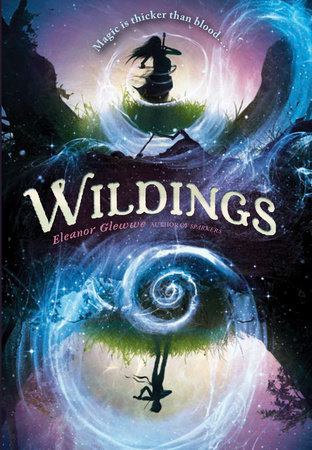Wildings by Eleanor Glewwe, 330 pp, RL 4
I love high fantasy, a term coined by Lloyd Alexander in 1971 for a subgenre of fantasy in which the setting is an alternative, imaginary world, like Tolkein's Middle Earth, although I don't read it that often. In fact, writing this review inspired me to go back through all my reviews and create the label High Fantasy. However, reading high fantasy can be a challenge, especially when there is a new vocabulary to learn. I realized this as I read Wildings by Eleanor Glewwe. Wildings is a sequel to Glewwe's debut from September 2014, Sparkers, which I didn't realize and wish I had read first. A powerful novel, Wildings can stand alone, but, knowing the plot of Sparkers, threads of which return in Wildings, I strongly suggest reading Sparkers first. And, while I now know one of the big reveals of Sparkers, I can't wait to get my hands on a copy and return to this incredible world that is filled with turmoil and social injustice, much like our own today.
Rivka Kadmiel lives in a world that is segregated. There as the kasari, who possess magical abilities and make up the ruling class, and the halani, the non-magical lower class. However, a mysterious plague that swept the city-state of Ashara four years earlier (and also forms the plot of Sparkers, so I will not reveal any more about it here) has resulted in some small steps toward desegregation. Now, one or two of the smartest halani are allowed to attend kasari schools. However, for Rivka, the daughter of an ambassador to Ashara, the most personally devastating aspect of segregation is the forcible adoption policy. If, at the age of ten, kasari children do not display magical talents, they are removed from their families and placed in halani homes. The same is true for halani children who possess magical talents and both are called wildings. Their former identities are erased and families must proceed as if the child never existed or face punishment. Rivka has spent the last four years mourning the loss of her twin brother, Arik, who failed to demonstrate magical abilities.
When Rivka's father takes a post in Ashara, a city she knows Arik has been sent to live in, she is more determined than ever to find him, despite the knowledge that it could lead to imprisonment for both of them. During a visit to Parliament at her father's invitation, Rivka hears the famous halan activist Marah Levi, speak out against forced adoptions and call for a moratorium on the policy until studies can show if it should be continued or ended for good. When Rivka befriends Caleb Levi, Marah's younger brother and the sole halan allowed to enter Firem Academy, fulfilling the desegregation of schools policy, she becomes involved in something greater than being reunited with Arik and her life is changed forever. Rivka is a complex character and is sometimes hard to like. In her singleminded quest to find her brother, she befriends people for their usefulness and is often unconsciously bigoted and unaware of her privileges. Yet, she is also self-aware and she grows as a character, making some hard, selfless choices.
Glewwe does a fine job world building in Wildings, which is expressed best through the forms of magic practiced in the different city-states and how the classes differ because of it. However, what Glewwe does best with her world building is create a structure that makes the social injustices both believable and horrible. The arguments for segregation from the kasari, especially the desire to remain "pure" are chillingly familiar. I especially appreciated and found relevant a discussion between characters about lifting formerly halan children out of poverty and giving them a good education versus the pain of separating them from their families. With Sparkers (which is a derogatory term for halani) and Wildings, Glewwe creates a believable world where segregation and discrimination go hand in hand with magical abilities, populating it with characters who passionately fight for change.
Source: Review Copy




